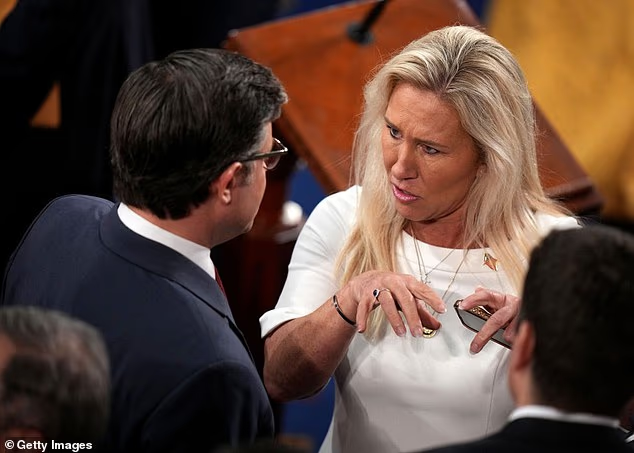Half a year into Donald Trump’s renewed presidency, Marjorie Taylor Greene is openly questioning her place within the Republican Party. The outspoken conservative who burst onto the political stage in 2021 and has remained a prominent figure within the House GOP and MAGA movement recently shared her doubts in a candid 45-minute conversation with the Daily Mail.
Greene admitted she’s uncertain whether she’s drifting away from the GOP or if the party itself is moving away from her. “I don’t know if the Republican Party is leaving me, or if I’m just not connecting with it as much anymore,” she said. Despite her unwavering loyalty to Trump, Greene sees warning signs that the party is losing touch with the MAGA base—the very audience she feels most aligned with, backed by her nearly seven million social media followers.
She criticized the GOP for abandoning its “America First” principles and neglecting everyday working Americans. Greene believes the party is slipping back into a “neocon” mindset dominated by established “good ole boys,” which she sees as a significant obstacle to advancing the true MAGA agenda. “I’m not intimidated by Mike Johnson at all,” she stated plainly.

Within the Republican women’s ranks, Greene holds a unique position, boasting the largest social media following of any female Republican, with about 7.5 million followers on X (formerly Twitter). At 51, the lawmaker advocates halting foreign aid, using Dogecoin to reduce government spending, curbing the national debt, and combating inflation.
Expressing frustration, she said, “I really don’t understand what happened to the Republican Party. But I know I don’t want to be part of the direction it’s heading.”
Greene also criticized the Georgia GOP for failing to resonate with voters. She welcomed not being a candidate in the upcoming Senate race, labeling Georgia’s Republican politics as controlled by a “good ole boys network” of cautious donors who back weak, moderate candidates. She warned that without Trump on the ballot in 2026, the GOP might struggle to defeat Democratic Senator Jon Ossoff, who currently holds a strong lead in polls—even against Greene herself.
Using her platform, Greene has openly challenged her party, notably calling Israel’s actions in Gaza a “genocide.” She’s also condemned U.S. involvement in foreign conflicts and questioned the secrecy surrounding Jeffrey Epstein’s files.
On the issue of Republican women, Greene suggested they have a better grasp on party dynamics than the male leadership, whom she accuses of mistreating women within the GOP. “Many Republican women are fed up with how they are treated,” she remarked, highlighting the case of Elise Stefanik. Stefanik was initially nominated by Trump for the U.N. Ambassador role but had her nomination withdrawn, reportedly due to a fragile House majority. Greene blamed White House officials and House Speaker Mike Johnson for this, rather than Trump himself.

She also called out Mike Waltz, a former congressman reassigned to the UN post despite controversy over a Signal chat involving a journalist, questioning how he received the appointment after what she called “Signalgate.”
In recent months, Greene has pushed legislation on unconventional issues for the GOP. She’s proposed banning cloud-seeding and chemical spraying in the atmosphere, making English the official U.S. language, and lowering capital gains taxes on homes to improve affordability.
Greene admits she’s largely operating solo on these issues without strong GOP allies, especially women, who share her priorities. Politically, she remains secure in her congressional seat, winning her last election with 64% of the vote and routinely defeating primary challengers by wide margins. Yet, statewide polls are less favorable. A recent survey showed her trailing Ossoff by 17 points, a gap she acknowledges and one reason she’s decided not to run for Senate.
“I had to fight off eight men in the primary, and I won that on my own—without help from President Trump or Mike Johnson,” Greene added, emphasizing her independent political resilience.



